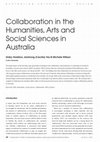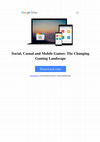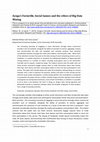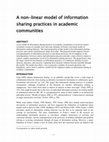Books by Michele A Willson
Social, casual and mobile games, played on devices such as smartphones, tablets, or PCs and acces... more Social, casual and mobile games, played on devices such as smartphones, tablets, or PCs and accessed through online social networks, have become extremely popular, and are changing the ways in which games are designed, understood, and played. These games have sparked a revolution as more people from a broader demographic than ever play games, shifting the stereotype of gaming away from that of hardcore, dedicated play to that of activities that fit into everyday life.

The Internet is a complex environment that affords many practices while constraining others. The ... more The Internet is a complex environment that affords many practices while constraining others. The challenge is to develop languages and tools to critically engage with these environments and to navigate the topology of being a citizen in a technologically mediated environment. This book begins this undertaking.
A New Theory of Information & the Internet first documents the historical emergence of the scientific, mathematical, computing, and human communication discussions on information, together with the rise of information as a resource and a commodity. It posits that the contemporary situation has not changed in terms of resolving exactly what information might be as a real thing. What has changed is the idea of information as a resource and a commodity, which has become a cultural trope—a standard way of looking at information. In the process of examining the understanding of information and communication, this book investigates the notion of an informed citizenry and the possibilities of a public sphere/s online within the context of the increasingly ubiquitous place of the Internet in social, informational life.

Mobile phones and SMS (short message service), the Internet and email, are digital technologies t... more Mobile phones and SMS (short message service), the Internet and email, are digital technologies that are transforming our ways of being together. Or are they? Cutting through the hype about how the Internet is revolutionizing the ways we relate to one another, Michele A. Willson offers a wide-ranging investigation of community in the digital age. Technically Together takes the reader on a thoughtful tour of the key writings on community and technology and the current debates that surround them to provide a clear understanding of the challenges new technologies present for theories of social interaction. Drawing on the political and social theory of a broad range of theorists from Charles Taylor and Jean-Luc Nancy to Mark Poster, and the most influential minds in the philosophy of technology from Marshall McLuhan to Martin Heidegger, Technically Together offers new ways of thinking about digitally mediated community.
Papers by Michele A Willson

The Australian Universities' review, 2017
A report into the humanities, arts and social sciences in Australia stated: ‘In an era when colla... more A report into the humanities, arts and social sciences in Australia stated: ‘In an era when collaboration is encouraged by institutions and by funding mechanisms, the pattern of collaboration is becoming an important consideration’ (Turner & Brass, 2014, p. 69). This paper seeks to explore aspects of collaboration in specific humanities, arts and social sciences (HASS) fields in order to identify the extent of collaboration, the countries Australian HASS authors are collaborating with, and to test whether collaboration is associated with higher impact as reflected in citations. It considers both national and international collaboration to gain an insight into collaboration patterns by different Australian regions and by different HASS fields. As a purely quantitative study, the research used co-authorship as a proxy for collaboration, thereby presenting a subset of the full range of activities that may occur in research collaboration. There are a number of reasons why collaboration ...
Children’s Well-Being: Indicators and Research, 2021
Early childhood is seen by many as the ideal time to shape, support and encourage the child in or... more Early childhood is seen by many as the ideal time to shape, support and encourage the child in order to become fully emotionally, intellectually and socially competent adults in the future. Discussions about the degree that children can participate and have agency in these processes are ongoing. However, what happens with these agentic capacities when decisions are made based on big data analytics and predictive algorithms?

Information, Communication & Society, 2016
ABSTRACT Our everyday practices are increasingly mediated through online technologies, entailing ... more ABSTRACT Our everyday practices are increasingly mediated through online technologies, entailing the navigation and also oft-simultaneous creation of large quantities of information and communication data. The scale and types of activities being undertaken, the data that are being created and engaged with, and the possibilities for analysis, archiving and distribution are now so extensive that technical constructs are necessarily required as a way to manage, interpret and distribute these. These constructs include the platforms, the software, the codes and the algorithms. This paper explores the place of the algorithm in shaping and engaging with the contemporary everyday. It does this via an exploration of some particular instances of algorithmic sorting and presentation as well as considering some of the ways these contribute to shaping our everyday practices and understandings. In doing so, it raises questions about understandings of agency and power, shifting world views and our complex relationship with technologies.

Media International Australia, 2015
While social games such as Zynga's FarmVille are often positioned as poor gaming experiences ... more While social games such as Zynga's FarmVille are often positioned as poor gaming experiences or as disguised financial and data-extraction processes (Bogost, 2010; Rossi, 2009), this article considers social games as part of a wider regime of social interaction and creative identity work. By definition, social games are located within extensive online social networks. Gameplay is thus situated within a number of overlapping contexts: the game, the broader social network and the material conditions of access, including different devices (mobile or desktop) and different locations. Moreover, given widely discussed differences between social game players and console- and PC-based game players (Wohn, 2011: 199), and game-play mechanics, these broader contexts further a reading of social gameplay as part of the diverse millieux of everyday life. The article argues that social games are spaces of creative expression, social dynamics and identity co-creation that cannot be understood w...

Journal of Contemporary Eastern Asia, 2015
This paper explores some of the ways in which social games-games played with others through socia... more This paper explores some of the ways in which social games-games played with others through social network sites such as Facebook-are situated within the everyday. It argues that social games are more than just games; they perform a range of interactive and integrative functions across and within people's lives and therefore need to be investigated as such. Social games enable spaces for and practices of creative expression, and identity management. They also form a mechanism through which relations can be enacted and maintained across and outside of the game environment. This argument requires the researcher to consider the panoply of ways in which people integrate social games within their lives and everyday practices. Part of a larger project, this paper explores some findings from an exploratory survey of Australian game players about their management and integration of game play within the everyday with a particular focus on gender.
Social, Casual and Mobile Games

Social, casual and mobile games, played on devices such as smartphones, tablets, or PCs and acces... more Social, casual and mobile games, played on devices such as smartphones, tablets, or PCs and accessed through online social networks, have become extremely popular, and are changing the ways in which games are designed, understood, and played. These games have sparked a revolution as more people from a broader demographic than ever play games, shifting the stereotype of gaming away from that of hardcore, dedicated play to that of activities that fit into everyday life. Social, Casual and Mobile Games explores the rapidly changing gaming landscape and discusses the ludic, methodological, theoretical, economic, social and cultural challenges that these changes invoke. With chapters discussing locative games, the new freemium economic model, and gamer demographics, as well as close studies of specific games (including Candy Crush Saga, Angry Birds, and Ingress), this collection offers an insight into the changing nature of games and the impact that mobile media is having upon individual...

Communication Research and Practice, 2015
The increasing necessity of engaging in social interaction through online commercial providers su... more The increasing necessity of engaging in social interaction through online commercial providers such as Facebook, alongside the ability of providers to extract, aggregate, analyse and commercialise the data and metadata such activities produce, have attracted considerable attention amongst the media and academic commentators alike. While much of the attention has been focussed on the data mining of social networking services such as Facebook, it is equally important to recognise the widespread adoption of large-scale data mining practices in a number of realms, including social games such as the well-known Farmville and its sequels, created by Zynga. The implicit contract that the public who use these services necessarily engage requires them to trade information about their friends, their likes, their desires and their consumption habits in return for their participation in the service. This paper will critically explore the realm of social games utilising Zynga as a central example, with a view to examine the practices, politics and ethics of data mining and the inherent social media contradiction. In determining whether this contradiction is accidental or purposeful, this paper will ask, in effect, whether Zynga and other big data miners behind social games are entrepreneurial heroes, more sinister FarmVillains, or whether it is possible at all to draw a line between the two? In doing so, Zynga's data mining approach and philosophy provide an important indicator about the broader integration of data analytics into a range of everyday activities.
This paper explores conceptions of the immaterial in human engagements with technology and techno... more This paper explores conceptions of the immaterial in human engagements with technology and technological systems. It employs two different theories of interruption, one technical and the other philosophical, as a means to examine the renegotiations of human-technology relationships that occur when a system, previously considered immaterial and judged inconsequential, reveals itself as significant. Two examples, the Millennium bug and Facebook’s provision of Open Graph, are used to illustrate people’s sudden recognition of the operation of underlying technological systems. This paper considers these moments as interruptions in order not only to analyse people’s reappraisal of the perceived immateriality of the technologies, but also to emphasise the value of recognising their consequence and apparent agency.

Library & Information Science Research, 2012
A new model of information sharing practices in academic communities is based on Latour's circula... more A new model of information sharing practices in academic communities is based on Latour's circulatory system of scientific facts and some elements of Foster's non-linear model of information-seeking behavior. The main proposition of this model is that information sharing practices and context simultaneously shape each other. The proposed model supports Foster's conceptualization of information practices as non-linear processes, but its emphasis on the interdependence between context and information practices provides a more effective means to capture complex negotiations involved in information sharing practices. The proposition is that the major reason for non-linearity in information practices is a continuous shifting of actors' interests, pressures, and concerns. Capturing these dynamic relations becomes possible through this model. The model also offers a way to generate a number of research questions and hypotheses, and as such it could be a useful tool for empirical studies on information sharing in academic communities.
Communication and Critical/Cultural Studies, 2012
Our sociality is increasingly enacted through technology. This essay argues that the relationship... more Our sociality is increasingly enacted through technology. This essay argues that the relationship between the technological mediation of social relations and the ways in which these practices are understood conceptually needs to be critiqued, rethought, and extended. Current approaches tend to accentuate the individual to the detriment of the social and often to understand technology instrumentally. Jean-Luc Nancy's notion of being singular plural and his understanding of the relations between singular beings and of ecotechnics are ...
Social games-games that operate within social network sites (SNS) and draw on a user's social gra... more Social games-games that operate within social network sites (SNS) and draw on a user's social graph-are a rapidly growing phenomena. According to AppData's facebook applications report,
Breaking boundaries: integration and interoperability: 12th Biennial Conference and Exhibition of the Victorian Association for Library Automation, Melbourne, Feb 1, 2004
Abstract: This paper reports on the pilot study for a survey regarding the use of the Internet by... more Abstract: This paper reports on the pilot study for a survey regarding the use of the Internet by academic staff at Curtin University of Technology for the purposes of informal scholarly communication. The survey included questions regarding the respondents' current and evolving research practices and their use of various services provided by the University Library. The paper reports on the relevant data, and suggests ways in which this might reflect on library services, in particular the development of institutional repositories as a ...

Convergence: The International Journal of Research into New Media Technologies, 2013
Social filtering – the selective engagement with people, communication and other information as a... more Social filtering – the selective engagement with people, communication and other information as a result of the recommendations of others – has always taken place. However, the possibilities of the Internet combined with the growth of online social networking activities have enabled this process to become rapidly more extensive, easier and potentially problematic. This paper focuses on the analysis of the politics of social filtering through social network sites. It argues that what is needed is both a closer examination and evaluation of these processes and also the development of a framework through which to begin such an evaluation. There is also a second intent: to (re)assert the argument that any analysis necessarily needs to take into account and critique the development, implementation and use of technologies (this includes the software, algorithms and code) themselves as well as the people that build and use them.
The popularity of Facebook social games is usually attributed to factors in the three areas of so... more The popularity of Facebook social games is usually attributed to factors in the three areas of social interaction, play experience and the possibility for easy, casual play (Kinder-Kurlanda, 2012). It is, however, unclear, how these factors relate to the everyday lives of the largest user group, namely female players over the age of 35. An exploratory study of Australian players of Facebook social games was conducted to shed some light on gender-specific play behaviour in everyday circumstances (Willson, 2015a, 2015b). A similar study is planned for the German context.

Scientometrics
Australia is a vast country with an average distance of 1911 kilometres between its eight state c... more Australia is a vast country with an average distance of 1911 kilometres between its eight state capital cities. The quantitative impact of this distance on collaboration practices between Australian universities and between different types of Australian universities has not been examined previously and hence our knowledge about the spatial distribution effects, if any, on collaboration practices and opportunities is very limited. The aim of the study reported here was therefore to analyse the effect of distance on the collaboration activities of humanities, arts and social science (HASS) scholars in Australia, using co-authorship as a proxy for collaboration. from each other. Establishing a hierarchical structure of different types of universities within a region can optimise the location advantage in the region to encourage knowledge exchange within that region. The stronger network could also attract more collaboration between networks.









Uploads
Books by Michele A Willson
A New Theory of Information & the Internet first documents the historical emergence of the scientific, mathematical, computing, and human communication discussions on information, together with the rise of information as a resource and a commodity. It posits that the contemporary situation has not changed in terms of resolving exactly what information might be as a real thing. What has changed is the idea of information as a resource and a commodity, which has become a cultural trope—a standard way of looking at information. In the process of examining the understanding of information and communication, this book investigates the notion of an informed citizenry and the possibilities of a public sphere/s online within the context of the increasingly ubiquitous place of the Internet in social, informational life.
Papers by Michele A Willson
A New Theory of Information & the Internet first documents the historical emergence of the scientific, mathematical, computing, and human communication discussions on information, together with the rise of information as a resource and a commodity. It posits that the contemporary situation has not changed in terms of resolving exactly what information might be as a real thing. What has changed is the idea of information as a resource and a commodity, which has become a cultural trope—a standard way of looking at information. In the process of examining the understanding of information and communication, this book investigates the notion of an informed citizenry and the possibilities of a public sphere/s online within the context of the increasingly ubiquitous place of the Internet in social, informational life.
Predictive algorithms are enacted in the everyday in multiple ways: for example, autosuggested google search terms; Amazon recommendations; or more controversially in predictive (and pre-emptive) policing practices. Prediction entails forecasting possible outcomes based on modelling, pattern detection and recognition through the (supervised and/or unsupervised) analysis of large data sets using iterative machine learning algorithmic processes. These practices inform strategies, policies and planning.
Within the contemporary child’s digital ecosystem/s, there are multiple and diverse predictive practices at play. This chapter explores a number of predictive practices in early childhood initiatives. In doing so, the paper raises questions about broader ethical, and normative issues for child rearing practices, and the possibilities for child or parental agency when predictive practices drive choices that are available, hidden or negated.